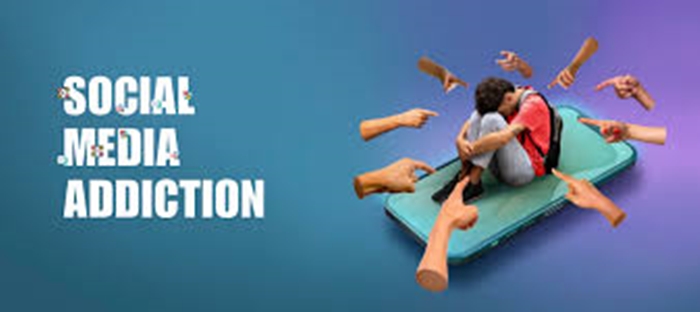In this article, we discussed the meaning of social media addiction, sign, causes, we also talked about the consequences and solutions.
Definition
Social media addiction is a type of behavioral addiction that is generally defined as compulsive engagement in social media platforms that significantly interrupts the users’ functioning in important life areas, such as interpersonal relations, work or study performance, and physical health.
Social media addiction is a behavioral addiction that is characterized as being overly concerned about social media, driven by an uncontrollable urge to log on to or use social media, and devoting so much time and effort to social media that it impairs other important life areas.
Signs of Social Media Addiction
Here are some signs that may indicate social media addiction:
Loss of control
People who are addicted to social media may find it difficult to control their usage. They may spend excessive amounts of time on social media, neglecting other responsibilities.
Withdrawal symptoms
When a person is unable to use social media, they may experience withdrawal symptoms such as anxiety, irritability, and restlessness.
Neglecting relationships
Social media addiction can stress personal relationships as addicts may prioritize social media usage over spending time with loved one
Obsessive checking
Addicts may feel the need to constantly check their social media accounts, even if there are no notifications or updates.
Neglecting self-care
Social media addicts may neglect basic self-care tasks such as eating, sleeping, and exercise in favor of spending time on social media.
Negative impact on mental health
Excessive use of social media has been linked to increased rates of depression, anxiety, and other mental health issues.
Consequences of Social Media Addiction
Some consequences of social media addiction include:
Anxiety and depression
Excessive social media use can lead to anxiety and depression, especially when users compare their lives to others on social media. Social media can create feelings of inadequacy, low self-esteem, and FOMO (fear of missing out), which can contribute to anxiety and depression.
Isolation
Social media addiction can lead to isolation as addicts may prioritize social media usage over spending time with loved ones. Social media may provide a temporary escape from real-world problems, but it can also create a sense of disconnection from the world around us.
Decreased productivity
Social media addiction can lead to a decrease in productivity as users spend excessive amounts of time on social media instead of completing tasks. This can impact work performance, academic achievement, and other areas of life that require focus and attention.
Sleep disorders
Social media addiction can also lead to sleep disorders, as users may stay up late scrolling through their feeds or checking for notifications. This can disrupt sleep patterns and lead to fatigue, irritability, and other health problems.
Cyberbullying
Social media addiction can increase the risk of cyberbullying, as users may be more likely to engage in online conflicts or share personal information that could be used against them.
Causes of Social Media Addiction
There are several factors that can contribute to social media addiction, including:
Dopamine Release
Social media use initiations the release of dopamine in the brain, creating a pleasurable sensation. This can lead to a desire for more social media use to maintain the pleasurable feeling.
Loneliness
Social media can be a way for people to connect with others, but it can also lead to feelings of loneliness when users are unable to connect with others in real life. This can lead to addiction as social media becomes a form of escape.
Peer Pressure
Social media use is often influenced by peer pressure, as users feel the need to keep up with their friends and followers.
Instant Gratification
Social media provides instant gratification in the form of likes, comments, and shares, which can be addictive.
Comparison
Social media often describes an unrealistic version of people’s lives, leading to feelings of insufficiency and low self-esteem. This can trigger addiction as users seek validation through social media.
Social Media Addiction Solution Options
Here are some social media solution options to try.
Turning off Social Media Notifications
Control Your Social Media Screen Time
Spend Time Offline with your Friends and Family in Real Life
Inculcate an Offline Hobby
Use Social Media as a Small Reward.
Limit your Social Media Appearance
Keep Your Phone Away While You Sleep
Delete Apps That You Don’t Use.
Quit Social Media
Conclusion
These days, several relationships start and break online, causing mental health issues like depression and loneliness. It is a growing problem among teens and young adults. Hence, education regarding social media is crucial. Last but not least, to mention the social media crimes that take place. Cybercrimes and other serious crimes happen cause of leaked privacy on social media. Social media can be a blessing if used correctly, smartly, and in control. However, it is essential to have a balanced perspective rather than differentiated views.


